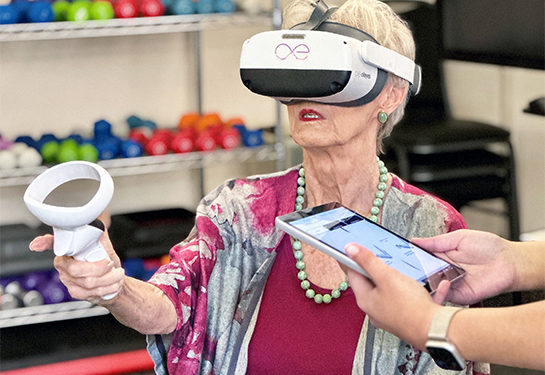Traumatic Brain Injury
A traumatic brain injury (TBI) can be a serious medical event. Whether your TBI is mild, moderate, or severe, our specialists can help you get back on your feet.
Medically reviewed by Ryan Martin, M.D. on May 01, 2024.

What Is a Traumatic Brain Injury?
A traumatic brain injury (TBI) is a serious injury that may occur if you experience a hard bump, blow, or jolt to your head. It can also happen if you’re hit with something that punctures your skull, like a bullet. A TBI can be mild, moderate, or severe, and includes concussions.
The Traumatic Brain Injury Clinic at UC Davis has expertise in diagnosing and treating TBI. We provide you with comprehensive care and customize treatment to focus on your recovery.
In addition, our Traumatic Brain Injury Research Program does research to further our understanding of TBI and how to best treat it. We have led TBI research for more than 20 years.
Traumatic Brain Injury Symptoms
Symptoms of TBI vary depending on whether your injury is mild, moderate, or severe. Some symptoms may show up right away. Others may appear days or weeks after your injury.
Common Symptoms
Signs of mild TBI may include:
- Nausea or vomiting
- Headache
- Fatigue
- Dizziness or problems with balance
- Vision changes and sensitivity to light
- Confusion
- Difficulty speaking
Emergency Symptoms
Signs of moderate to severe TBI may include:
- Loss of consciousness
- Headache that won’t go away
- Weakness in your arms or legs
- Seizures or convulsions (shaking)
- Dilated eyes (eyes with big pupils)
Causes of Traumatic Brain Injury
There are many possible causes of TBI in both adults and children. TBI can occur any time there is a severe blow to your head. Some of the most common causes of TBI include:
Falls
Nearly half of TBI-related hospitalizations result from falls. A TBI can occur from many types of falls, such as falling out of bed or down a flight of stairs.
Motor Vehicle Crashes
Accidents involving cars, motorcycles or bicycles commonly cause traumatic brain injuries.
Sports Injuries
Participating in high-impact sports like football, soccer and boxing may lead to traumatic brain injuries.
Assaults
Domestic violence, child abuse and other types of violence may cause traumatic brain injuries.
Traumatic Brain Injury Risk Factors
Certain factors can increase your risk of traumatic brain injury, including:
Older Age
People ages 60 and older have an increased risk of falling, which increases the chances of getting a TBI.
Younger Age
Babies, toddlers and teenagers face an increased risk of TBI because their brains aren’t fully developed yet.
Biological Sex
Males may be more likely to engage in activities that lead to injury, putting them at a higher risk of TBI. Females are at higher risk for sports-related concussion.
Diagnosing Traumatic Brain Injuries
To diagnose a TBI, we will perform a physical exam, and ask about your symptoms and what caused the injury. We may also perform a neurological exam to test your:
- Mental status
- Coordination and balance
- Sensory and motor skills
If we think you have a TBI, we may order imaging tests to see the extent of your injury. These tests may include a CT scan or an MRI. Both help us check for swelling and bleeding in the brain.
Treatment for Traumatic Brain Injury
Treatment for a TBI depends on the type and severity of the injury. Possible treatments may include:
Rest and Pain Medications
Mild TBI can usually be treated with a brief period of rest and over-the-counter pain reliever. This is followed by a gradual return to normal activities.
Surgery
Surgery may be needed if you have a moderate or severe TBI with severe bleeding or swelling of the brain. Our surgeons can relieve pressure in your skull, remove blood clots and make other repairs.
Rehabilitation
After surgery, you may need different therapies to help you recover. These can include occupational therapy, physical therapy and speech therapy. You may also need psychological support for mood disorder, such as anxiety, depression, and post-traumatic stress disorder (PTSD).
Preventing Traumatic Brain Injury
Traumatic brain injuries cannot always be prevented. But there are things you can do to reduce your risk, such as:
Avoid Falls
Safeguard your home by installing handrails for stairs and removing rugs and electrical cords that may make you trip.
Buckle Your Seatbelt
Always put on your seatbelt when riding in a car.
Wear Protective Gear
Wear a helmet to protect your head, whether you’re playing a sport or riding your bike.
There are about
586Hospitalizations related to TBI each day
Males are
2xMore likely to be hospitalized from a TBI than females
Source: Centers for Disease Control and Prevention (CDC): TBI Data
Request an Appointment
As Sacramento's No. 1 hospital, you'll benefit from unique advantages in primary care and specialty care. This includes prevention, diagnosis and treatment options from experts in 150 specialties.
Referring Physicians
To refer a patient, submit an electronic referral form or call.
800-4-UCDAVIS
Patients
Call to make an appointment.
Consumer Resource Center
800-2-UCDAVIS

Ranked among the nation’s best hospitals
A U.S. News & World Report best hospital in cardiology, heart & vascular surgery, diabetes & endocrinology, ENT, geriatrics, neurology & neurosurgery, and pulmonology & lung surgery.

Ranked among the nation’s best children’s hospitals
U.S. News & World Report ranked UC Davis Children’s Hospital among the best in pediatric nephrology, orthopedics*, and pulmonology & lung surgery. (*Together with Shriners Children’s Northern California)

Ranked Sacramento’s #1 hospital
Ranked Sacramento’s #1 hospital by U.S. News, and high-performing in aortic valve surgery, back surgery (spinal fusion), COPD, colon cancer surgery, diabetes, gynecological cancer surgery, heart arrhythmia, heart failure, kidney failure, leukemia, lymphoma & myeloma, lung cancer surgery, pacemaker implantation, pneumonia, prostate cancer surgery, stroke, TAVR, cancer, orthopedics, gastroenterology & GI surgery, and urology.

The nation’s highest nursing honor
UC Davis Medical Center has received Magnet® recognition, the nation’s highest honor for nursing excellence.

World-class cancer care
One of ~59 U.S. cancer centers designated “comprehensive” by the National Cancer Institute.

A leader in health care equality
For the 13th consecutive year, UC Davis Medical Center has been recognized as an LGBTQ+ Healthcare Equality Leader by the educational arm of America’s largest civil rights organization.

